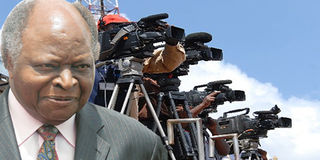Why Kibaki ordered fresh talks on anti-media law

Graphic/Rachel Ombaka
President Kibaki on Wednesday bowed to pressure and changed his stand on the anti-media law, which he signed last week.
After consulting some members of the Cabinet, he directed Attorney General Amos Wako and Information minister Samuel Poghisio to prepare amendments that will restore press freedom.
The President’s decision came after a series of meetings with senior members of his Cabinet who were concerned about the negative reputation the Government was getting because of the anti-media law.
Losing public support
The main concern was that the President and his supporters, some of who hope to succeed him when he retires in 2012, were losing public support to their ODM rivals.
The last of the meetings that started on Tuesday took place on Wednesday at Harambee House, Nairobi. It was agreed that the Government should take charge of the process of reviewing the Kenya Communication (Amendment) Act 2008 and take the initiative from ODM and Prime Minister Raila Odinga, who have been opposed to the law.
Sources named those who attended the meeting as Deputy Prime Minister Uhuru Kenyatta, Internal Security minister George Saitoti, Energy minister Kiraitu Murungi and Nairobi Metropolitan Development minister Mutula Kilonzo.
After the talks, the Presidential Press Service released a statement saying the President had listened to the media industry’s concerns on the new law and had directed Mr Wako and Mr Poghisio to study the issues and draft amendments that will be tabled before the Cabinet for approval.
Said the PPS statement: “President Kibaki has today directed the Attorney General and the minister for Information and Communication to study amendments members of the media have proposed to the Kenya Communication (Amendment) Act, 2008 and the Kenya Communications Act.”
After they agree with the media stakeholders, Mr Wako and Mr Poghisio were directed to take the amendments to the Cabinet.
“The President has further directed that the Attorney General and Minister for Information and Communications should bring appropriate recommendations on the proposed amendments to the Cabinet for consideration,” the statement said.
However, the first signs of changing tunes at State House did not mean that the war against offensive clauses in the law had been won, given the steps that have to be taken before independence of the media can be guaranteed.
The quickest approach would have been for the President to decline signing the Media Bill into law and sending it back to Parliament with a memorandum seeking to have the offensive sections amended.
But he signed the Bill into law on Friday and explained that media concerns that targeted Section 88 of the Act should be addressed separately because the section was part of the parent law, the Kenya Communications Act of 1998.
At the time, the President said that his refusal to sign the Bill would not have solved the problem. In his view, Section 88 was not part of the amendments. He advised that the offensive section be addressed separately.
However, Mr Odinga and ODM opposed the President’s move and undertook to work on amendments to the Act with the PM describing the law as “ill-advised and a bad legislation.” They argued that the country should not be taken back to the dark days of suppression of the media.
Amendments
On Tuesday, Kisumu Town West MP Olago Aluoch (ODM) filed a motion with the Speaker seeking to delete Section 88 from the Act. Deputy PM Musalia Mudavadi, after meeting media owners on Tuesday, said the party would present a list of amendments to the Act during Thursday’s Cabinet meeting.
On Wednesday, ODM MPs met at Orange House and maintained the Act was flawed and would curtail media freedom and should, therefore, be amended.
They proposed that Government spearhead consultations with the media regarding the contentious issues in the Act with a view to drafting amendments. The Information and Communication minister should then move to have a Bill acceptable to the media tabled in Parliament.
But as they were agreeing on the amendments they could table before Thursday’s Cabinet meeting, the President stole the thunder from them when he said he was responding to a letter listing amendments from the Media Owners Association chairman, Mr Linus Gitahi, in December just after Parliament passed the Bill.
The letter was handed to the President by Mr Odinga on the request of Mr Gitahi, the Nation Media Group chief executive officer, who was accompanied by members of the MOA during a courtesy call on the PM in mid December.
On Wednesday afternoon, Mr Wako held a meeting with representatives of the Media Owners Association, led by Mr Gitahi, secretary Sheila Amdany, Mr Patrick Quarcoo and Mr Leo Slingerland.
AG is studying
“The media owners gave him a memorandum, which the AG is studying and will get in touch with MOA,” said Mr Wako’s spokesman, Mr Dominic Onyango.
Speaking on behalf of media owners, Mr Gitahi called for unity between the two sides so that any future amendments to the Communication (Amendment) Act can succeed in Parliament. “We must reach out to everybody so that this issue has the highest chance of success once it hits the floor of Parliament,” he said.
The Editors Guild welcomed the President’s gesture and said they were willing to attend the stakeholders meeting on the offensive Act.




